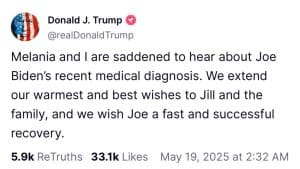News that former President Joe Biden has been diagnosed with an aggressive form of prostate cancer that has spread to his bones quickly made headlines—and so did Donald Trump’s reaction.
Posting on his platform, Truth Social, Trump began with a message of sympathy: “Melania and I are saddened to hear about Joe Biden’s recent medical diagnosis,” he wrote. “Joe, may you make a full recovery. Our deepest sympathies go out to Jill and the family.”

But in typical Trump fashion, he didn’t stop there. He went on to question the timing of the announcement, suggesting the White House may have withheld the news until now for political reasons. “It takes a long time to reach stage nine,” Trump claimed—although medically, prostate cancer is typically staged from I to IV, not I to IX.
That statement raised eyebrows, as it seemed to reflect some confusion. Trump appeared to mix up the Gleason score, a system used to assess how aggressive prostate cancer is, with cancer staging—two different things. He implied that the delay in informing the public could mean Biden’s team wasn’t being fully transparent. “Somebody is not telling the facts,” he said.

Trump’s remarks have sparked a broader conversation about how much the public should know about the health of elected officials—especially presidents. Critics of the Biden administration argue that Americans deserved to know about the diagnosis sooner. Some medical experts have pointed out that aggressive prostate cancer can progress over time, which raises the question of whether Biden may have been battling the disease during his presidency.
Whether you see Trump’s comments as genuine concern or political maneuvering, they’ve added fuel to the ongoing debate about medical transparency at the highest levels of government.





